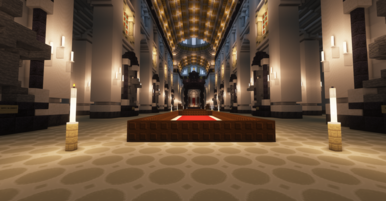More actions
No edit summary |
No edit summary |
||
| Line 6: | Line 6: | ||
An Ecumenical Council is a meeting of bishops and other church authorities called by the Pontifex, which issues a decree of the faith. The members consider and rule on questions of Christian doctrine, administration, discipline, and other matters. The Church recognizes 21 Ecumenical Councils of the Catholic Church as documented in the ''Lux Orbis,'' and has subsequently held two of its own councils. | An Ecumenical Council is a meeting of bishops and other church authorities called by the Pontifex, which issues a decree of the faith. The members consider and rule on questions of Christian doctrine, administration, discipline, and other matters. The Church recognizes 21 Ecumenical Councils of the Catholic Church as documented in the ''Lux Orbis,'' and has subsequently held two of its own councils. | ||
=== 1. The First Council of | === 1. The First Council of Ecclesiovsk (2745) === | ||
The First Council of | The First Council of Ecclesiovsk was called by [[Pontifex St. Konstantin I]], and was held in St. George Parish. Only 20 members strong, the meeting decreed the [[Ecclesiovsk|State of Ecclesiovsk]] to be founded in the body of the Pontifical Church, granted the Office of the Pontificate absolute authority over spiritual and temporal matters of the Church and jointly the State of Ecclesiovsk, laid the procedures of the Conclave and Pontifical succession, and abolished the Roman Curia. The council lasted two months, and became the foundation for the Pontifical Church as it remains today. | ||
=== 2. The Second Council of | === 2. The Second Council of Ecclesiovsk (2781) === | ||
The Second Council of | The Second Council of Ecclesiovsk was called by [[Pontifex Konstantin III]], and was held in the newly built Archbasilica of Christ the Saviour. The council convened to address the state of affairs after the leadership of [[Konstantin II]], which left the country in deep political and financial despair. Lasting four months, the council decreed the formation of the present day Pontifical Cabinet, made up of appointed secretaries to assist the Pontifex in maintaining the country through his authority. The council also established pathways for non-clerical citizens to be employed in government departments and projects. | ||
=== 3. The Council of Lancastria (3022) === | === 3. The Council of Lancastria (3022) === | ||
Revision as of 15:14, 16 November 2023

Ecumenical Councils
Overview
An Ecumenical Council is a meeting of bishops and other church authorities called by the Pontifex, which issues a decree of the faith. The members consider and rule on questions of Christian doctrine, administration, discipline, and other matters. The Church recognizes 21 Ecumenical Councils of the Catholic Church as documented in the Lux Orbis, and has subsequently held two of its own councils.
1. The First Council of Ecclesiovsk (2745)
The First Council of Ecclesiovsk was called by Pontifex St. Konstantin I, and was held in St. George Parish. Only 20 members strong, the meeting decreed the State of Ecclesiovsk to be founded in the body of the Pontifical Church, granted the Office of the Pontificate absolute authority over spiritual and temporal matters of the Church and jointly the State of Ecclesiovsk, laid the procedures of the Conclave and Pontifical succession, and abolished the Roman Curia. The council lasted two months, and became the foundation for the Pontifical Church as it remains today.
2. The Second Council of Ecclesiovsk (2781)
The Second Council of Ecclesiovsk was called by Pontifex Konstantin III, and was held in the newly built Archbasilica of Christ the Saviour. The council convened to address the state of affairs after the leadership of Konstantin II, which left the country in deep political and financial despair. Lasting four months, the council decreed the formation of the present day Pontifical Cabinet, made up of appointed secretaries to assist the Pontifex in maintaining the country through his authority. The council also established pathways for non-clerical citizens to be employed in government departments and projects.
3. The Council of Lancastria (3022)
The Council of Lancastria was called by Pontifex Konstantin IX, and was held in the Cathedral-Basilica of St. Michael the Archangel. The council convened to address the schismatic breakaway Rockfield Christian Church, which formed as a result of the Rockfield Succession Crisis in 3021. The council lasted from 08/14/3022 to 09/21/3022. The council published one decree, which reconciled the schismatic sect into a new rite, the Rockfield Rite, of the church. The new rite directly enabled the King of Rockfield in the office of Legatus control over the rite to govern reunification efforts.
